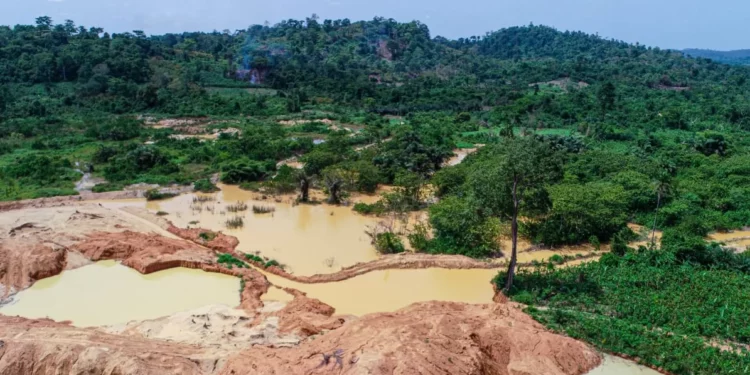Galamsey: Coalition of CSOs, Trade Unions and Religious Bodies Demand State of Emergency Over Ghana’s Polluted Water Bodies
In a powerful display of solidarity, a coalition of civil society organizations, trade unions, and religious groups in Ghana has issued a clarion call for immediate government intervention to combat the devastating impact of illegal small-scale mining, commonly known as “galamsey.”
This united front, comprising prominent entities such as the Media Coalition Against Galamsey, the Trades Union Congress (TUC), and the Ghana Catholic Bishops’ Conference, has condemned the government’s perceived inaction in addressing what they describe as a national crisis.
Recent tragedies, including the heartbreaking loss of two young children who fell into unregulated mining pits, have brought the issue of galamsey into sharper focus. In a parallel development, the Ghana Water Company Limited recently announced the suspension of water treatment operations due to severe pollution from illegal mining activities. This situation has left communities near critical water sources like the Densu River in a dire state, facing health risks associated with consuming contaminated water.
The coalition emphasizes that the environmental degradation caused by galamsey is not a mere backdrop but a pressing issue that directly affects the livelihoods and well-being of countless Ghanaians. Water bodies such as the Pra, Ankobra, and Tano rivers, once vital sources of life, have become toxic, with reported pollution levels far exceeding acceptable standards. The impact on agriculture is equally alarming, as illegal mining destroys arable land and undermines food security.
Communities, particularly those in mining regions, are witnessing a dramatic breakdown of law and order. Reports of armed miners repelling enforcement teams reflect a troubling trend of impunity that exacerbates human rights abuses and social unrest. The erosion of governance and the prioritization of short-term economic gains over environmental stewardship have led to a palpable sense of frustration among citizens.
The coalition’s demands are clear and urgent. They are calling for the President to declare a state of emergency in regions affected by galamsey, asserting that immediate military intervention is necessary to dismantle illegal mining operations. Furthermore, they insist on a halt to all mining activities within a specified buffer zone around water bodies to safeguard vital resources. The proposed establishment of special courts for swift prosecution of offenders underscores the coalition’s call for accountability and rule of law.
While the government has previously pledged to combat illegal mining, critics argue that actions have not matched rhetoric. The coalition’s statement underscores a growing impatience with the current administration’s inability to stem the tide of environmental degradation and social injustice associated with galamsey. “Ghanaians deserve far more than what we are witnessing today,” the coalition asserts, urging the government to prioritize the welfare of its citizens over electoral ambitions.
As Ghana approaches its next election cycle, the coalition is calling on all political parties to publicly commit to tackling the galamsey crisis. They emphasize the need for a collective approach that transcends partisan politics, urging candidates to place the health of the nation above political expediency.
The coalition’s message is unambiguous: the time for action is now. The deterioration of Ghana’s natural resources and the threat to public health cannot be ignored any longer. With their ultimatum set for the end of September, civil society groups are poised to escalate their protests if their demands are not met. The stakes have never been higher, as the fate of Ghana’s environment and the well-being of its people hang in the balance.








